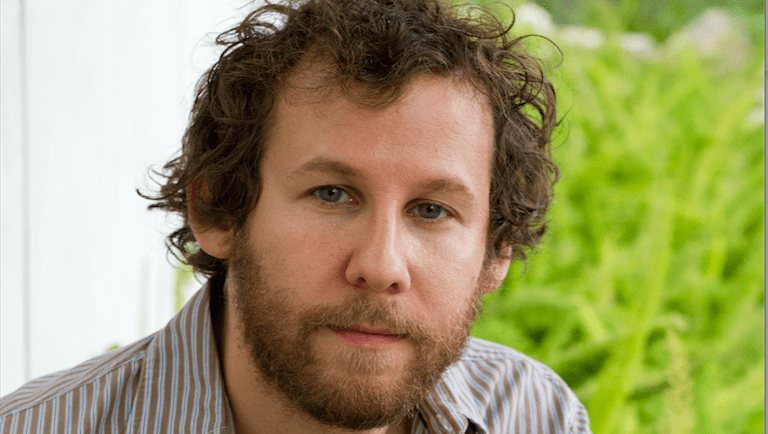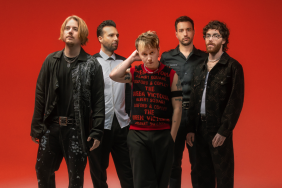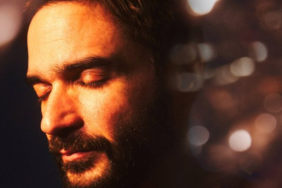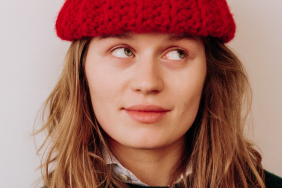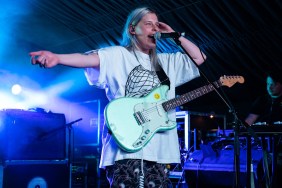“No! No! It’s a fruit!” It’s the mid-afternoon in Los Angeles, and Ben Lee is passing on vital information to his five-year-old daughter, Goldie, who has arrived home from school with her first ever bit of homework. Lee is dispelling the myth that a tomato is a vegetable, as he justifies with a giggle, “It’s something you have to get out of the way early.”
A dedicated father and husband, Lee has reduced his activity in the music world in more recent years in order to focus on his family. Nevertheless, he always knew that he could never walk away from music entirely. As a matter of fact, he claims that it has made him want to pursue his love for music even more.
His tenth studio album, Love is the Great Rebellion, is set for release next month; and while it may seem as though it’s a back-to-basics Ben Lee album at first, he hopes fans will dig below surface value. They may, after all, be surprised by what they find.
Lee speaks here, openly and candidly, about the new record; as well as, among other things, its place in his discography, returning to the touring life in his just announced shows in June, and what being a father means to him.
Watch: Ben Lee – Gamble Everything For Love
Music Feeds: From what we know about Love is the Great Rebellion, this is an album that feels more like a quote-unquote “traditional” Ben Lee album. Your last album, Ayahuasca: Welcome to the Work, was potentially your most divisive release to date. Do you feel as though this new album is coming to terms with what you initially set out to do as a songwriter?
Ben Lee: Y’know, it’s funny. After Ayahuasca, I originally wanted to make an album that was even weirder. Then, when I started writing, all of these pop songs just came out. It came to a certain point where I realised I was heeding a call to re-explore something that people would associate with what Ben Lee. My brand, so to speak.
People have associations with you as an artist. I think, with this record, for whatever reason what was coming more naturally was what people would normally associate with me. That’s just on a sonic level, however.
Lyrically and conceptually, I feel like I’ve kept moving forward. There’s a lot of new territory on this record. There’s a lot of things that I want people to think about on this record. It’s just that the vessel that they arrive is more what they’ve come to expect from one of my albums.
MF: So what is it, exactly, that you’re dealing with on this album? What’s the conceptual driving force? Particularly in the last decade, it’s been a mix of romanticism and philosophy, your relationship with culture and your immediate relationship with those around you. Does that develop on this album?
BL: The album is called Love is the Great Rebellion. It’s about courage, in a sense. We started this conversation talking about things that I’ve done that are polarising and this album is about having the courage to follow your instinct and to do those things.
Love seems, to me, to be something that can only exist in the present. For me, in order for it to continue, to continue exploring what love means – the love of music, the love of a human being, the love of a child, the love of God… in order for love to continue, you have to let go of the past. To give it up. The courage to let go of yesterday. It’s the type of rebellion that’s internal, that’s personal. That’s the sort of thing that I was writing about on this album.
Listen: Ben Lee – In The Silence
MF: Love is the Great Rebellion comes at a particularly interesting time in the canon of Ben Lee, it falls in the same year of two particular album anniversaries. It’s been 20 years since your debut solo album, Grandpaw Would; as well as ten years since Awake is the New Sleep.
Both of those albums were essentially new beginnings for you, allowing you to start over in very different senses. What reflections do you make on these records? What relationship do you hold with them?
BL: Grandpaw Would was a record about possibility. I was 14, 15 years old; and the world was providing me these opportunities to sing. It felt like the universe was working in my favour. Although it was something I had hoped for and wished for, it was something that I wasn’t expecting it. I was as shocked as anyone – including my critics.
I really hear a type of innocence in that record, and also a confidence that can only come through not having failed yet, in a sense. [laughs] When you start your first band, you think you’re going to take on the world. You have your own truth. It was a very innocent time, but when I listen to the music, I hear a lot of imitation.
That’s another part of being young: you’re trying to imitate your heroes. There’s an insecurity, I suppose, that comes with the territory. You don’t truly know who you are, in a lot of ways.
MF: What about Awake is the New Sleep? That is a record that many perceive as not only your best record, but the record that set you on the path to who you are now.
BL: It was very much my first “grown-up” record, so to speak. It’s the first record that began my adult career; and it’s the record that had my biggest hits on it. I suppose that it’s the first record that I truly began to tackle the idea of awakening consciousness and what that means. There’s a lot of spirituality on that record. In a way, it was a mission statement. This is who I am now. This is my path.
MF: Last year, you were a guest on the Improv 4 Humans podcast, in which you played songs in order to spark ideas for scenes of improvised comedy.
On the podcast, you played a lot of very old songs. A lot of people would not ever want to even hear the songs that they wrote when they were teenagers again; and yet you’re seemingly content enough that you’ll happily oblige if someone wants to hear a song like I Wish I Was Him. We talked about letting go of the past, how do you bond and connect with songs so far back in your discography now?
BL: I’m not hugely interested in the past. Like a lot of artists, I tend to predominantly focus on what I’m doing in the present moment. When you do some of these anniversary things, where you have to listen to remastered versions or write liner notes, it kind of forces you to have that relationship again. I try and have a light touch with the whole thing.
I knew Matt Besser was a fan of my early stuff, so I just asked him what songs he wanted to hear for that episode. I’m lucky that I have a body of work to draw upon that’s twenty years old. I have no expectations, though. I mean, you’re a writer, I’m sure you have pieces of writing that you did when you were 15 that you’d think would be absurd if you were asked to read it and connect with that person who wrote it. I just try and have a sense of humour about it, and realise that it’s my own unique path.
Watch: Ben Lee – I Wish I Was Him
MF: A lot of artists don’t accept their fate like that, especially with child stars. You see a lot of people ignore who they were completely; to the point where they don’t even acknowledge that it was them. That’s definitely not the case with you. If someone wants to hear a super-old song, you seem to generally be happy to oblige.
BL: There’s a side of me that’s a creative artist and a side of me that’s a performer. As a performer, there’s a part of me that takes a great joy in giving an audience what they want. That doesn’t necessarily mean that it’s going to touch the innermost creative part of me – it’s just fun. It’s a crowd-pleasing moment.
There’s always room for that kind of thing. At the same time, it’s performance. I don’t know, I’ve always been okay with that. I don’t think you can be a pop artist and discount the idea that it’s a performance-based art.
Getting the crowd to sing along and have a good night is part of giving an audience what they want. In order for you to have a long and satisfying career, you have to find a balance between what you want and what they want.
MF: Where do shows typically go for you these days, on that note? Are you inclined towards the newer material, or do you take the show as it comes and see what it is that the audience wants?
BL: It’s kind of a mixture. I’ve been doing some online streaming concerts, and I’ve got Google right there in front of me. They can name more or less any song, and I can look it up if I can’t remember how to play it and then play it for them right then and there. There’s a room for a lot for spontaneity in that environment.
There’s a bit less when I’m playing with other people. They can only play the songs that they know or that they’ve learned. I haven’t been on a touring circuit for awhile, I’ve only done one-offs here and there. With this album, I’m gearing up to being on the road again. I get a chance to explore what is that the current sense of what I do. I anticipate it’ll be half-and-half between the old and the new. It’s a little bit different with me, though, as opposed to your regular rock band.
I grew up with the belief that you shouldn’t have to know any of a band’s songs to enjoy the show. I enjoy Jonathan Richman, folk music, country music… none of that sort of thing is dependent on knowing the songs. You can hear the lyrics, you can hear the stories, the artist connects you in and talks between the songs.
For me, I hope that I’m able to draw people in no matter what I’m playing. I genuinely hope that people aren’t just left twiddling their thumbs as I play a new song, not just waiting to hear Catch My Disease.
Watch: Ben Lee – Catch My Disease
MF: There are a few Australian shows happening in June. When you come back, is it weird to see Australia on an intermittent basis? Do you notice the changes between visits?
BL: I don’t know so much if it’s weird. It’s funny, because I obviously haven’t lived in Australia for many years on a permanent basis. I was very lucky that pretty much ever since I left Australia, my career took off. I was 18 when I left to make Breathing Tornados; and then I had my first hit in Australia with Cigarettes Will Kill You.
I’ve been very fortunate in being able to maintain a connection. There are a lot of artists whose work is never well-received, wherever they’re from. Life’s different when you have kids, your world is a bit smaller. You’re in your own little village.
I don’t even know what’s going on down the street half the time. You become more occupied with your immediate responsibilities. I’ve always just felt a real sense of gratitude when it comes to Australia. I always have people coming back to see me every single time that I return.
MF: Does Goldie have a comprehension of Australia yet? Is it difficult to explain that even though she lives in America with her American family, her dad comes from this really far-away place?
BL: She understands that I’m Australian. I’ve even explained that she’s half-Australian. Being in LA, there’s actually a constant cascade of Australians that are coming through here – musicians, actors, athletes, all these people.
I think that the Australian identity, in a way, is still very much a part of me and a part of my family. I even notice my accent getting thicker when I’m around other Australians. That’s definitely been a part of what she’s grown up with, and I love that she understands that.
Watch: Ben Lee – Cigarettes Will Kill You
MF: How do you measure the impact that fatherhood has had on the way you work with music and performing now?
BL: Well, I think that depends. Do you mean in terms of my parenting or in terms of my career?
MF: Both, really.
BL: In terms of my parenting, it actually made me more passionate about following my passions. It made me more determined. You’re trying to teach your kids to be true to themselves, to express themselves, to be kind. You have to rise to that challenge yourself. It made me more playful, and more expressive of my creativity.
In terms of my career, I definitely took a step back. I saw it as a bit of a dividing line; a before and after. Before [2009 LP] The Rebirth of Venus, I was still chasing a very particular dream. In a way, I let that go when I became a parent. I couldn’t be that full-time rockstar anymore. [laughs] Not that I ever achieved it, it was just a fantasy. I just tried to move gracefully into another part of my life.
For me, it’s been kind of interesting. The whole industry has moved in parallel with my own changes. The industry was really falling apart, and the rules changed on what made you an artist. They disappeared. It kind of worked to my benefit, in a sense.
I don’t think anyone knows what a conventional musician is anymore. There’s no set idea of what a conventional career is. It made me wonder what that meant to me. What does success mean to me? What does it look like to me? How do I measure it? What is creative freedom? How much do I want to be involved with the corporate side of the industry? How much compromise do I want to make?
All of these questions seem really relevant to musicians right now. The timing is right. There are a lot of avenues to express yourself outside of the industry now, as well. I feel like it’s been quite a natural evolution.
–
‘Love Is A Great Rebellion’ is out May 29. Check below for dates and deets on Ben Lee’s upcoming Australian east coast tour.
Listen: Ben Lee – Big Love
Ben Lee 2015 East Coast Tour Dates
Frontier Members pre-sale from Monday 27th April (11am AEST) to Tuesday 28th April (11am AEST).
General public tickets on sale from 10am local time, Wednesday 29th April.
Friday, 5th June
Black Bear Lodge, Brisbane (18+)
Tickets: Oztix | 1300 762 545
Saturday, 6th June
Newtown Social Club, Sydney (18+)
Tickets: Newtown Social Club | 1300 724 867
Sunday, 7th June
Northcote Social Club, Melbourne (18+)
Tickets: Northcote Social Club | 1300 724 867
